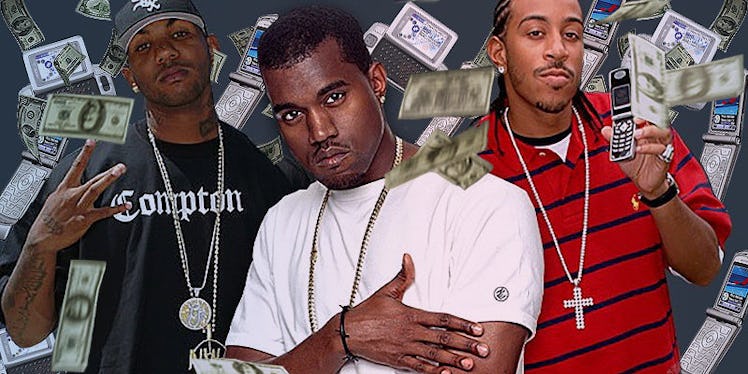
Your Favorite Rappers Actually Made A Fortune Off Those Annoying Ringtones
It's safe to say everyone had a 50 Cent song as their ringtone at one point.
Or maybe it was Ludacris. Definitely Yung Joc. And you really weren't sh*t without some Chingy!
Don't worry, you're not alone. Everybody owned a Nokia flip phone or Sidekick II in the 2000s, and it's nothing to be ashamed of.
From 2004 to 2007, a sub-genre of hip-hop emerged that never truly got the respect it deserved.
When it comes to the ringtone rap era, it's hard to find any other moment in time that could compare.
One-hit wonder rappers like J-Kwon, D4L (the "Laffy Taffy" dudes) and Mike Jones were all making a killing a decade ago. Despite their overall lack of taste, we all bought their ringtones!
Billboard even added the Ringtone Of The Year award in 2004; it was won by 50 Cent's "In Da Club."
Unlike many ringtone rappers, 50 Cent managed to stand the test of time and produce more than just a handful of hits.
A lot of that had to do with his business acumen, but in 2005, "Candy Shop" had over 1.9 million downloads alone, according to USA Today.
At the height of ringtone rap era in 2006, global sales for ringtones totaled $4.6 billion.
According to Vice, downloadable music clips to mobile phones became a billion-dollar industry.
For just two cash, you could have 10 to 15 seconds of your favorite rap song (and there were many) as the official anthem for whenever your mom called you to come home.
Ringtones were easy investments for anyone trying to make a statement -- like "yeah bitch, I got a cell phone" -- but we might've forgotten dollars added up and pockets were getting fed.
In 2007, rappers made $881 million in the US alone.
According to Fortune, rappers in the United States at the time were some of the biggest earners with ringtones.
People weren't going out there and just buying one ringtone, either. It soon became a thing to have half an artist's catalog on your phone for absolutely no reason.
With clips of music going anywhere from $.99 to $2.99, these numbers added up to a nice check for both the artists and distributors.
In comparison, 500.5 million albums were sold that year -- a 9.5 percent decline from 2006.
This also became a grey era in hip-hop as pop fluff began to become more recognized and real artistry was getting lost.
According The New York Times, album sales began to drop and an overall lack of originality made everything sound the same.
The oversaturation of meaningless songs with hot beats and catchy hooks made specifically for your mobile device became the new trend and hip-hop purists began to worry.
Was ringtone rap really the worst thing to happen to hip-hop?
Respected like artists like Nas recognized this era of unoriginality and fakeness would not last very long.
In a 2012 interview with Steve Stout, he explained,
I have to be totally honest, I didn't feel anything about Chingy or anybody else's success during that time. Tell you the truth, it kind of gave me some time off. Time off to not have to keep coming and coming and coming. It just balances things -- you can't have everything… it is messed up for that real stuff when the pop-fluff stuff is everywhere; that does damage to things. But when you have faith in the artists that you love, you know they gonna pull through and bring something to the table.
Companies, like Boost Mobile, started taking advantage, enlisting rappers like Kanye, Ludacris and The Game for their new campaigns.
Commercialism in hip-hop has always been a struggle the artists have to deal with, but it's all about how they approach it that makes the difference.
The ones smart enough to pimp the game out before it pimps them are always the ones who come out on top. The ones who don't think about the bigger picture and go with the flow get f*cked.
Real talent conquers all in the industry, and luckily, those who had it remained relevant because of wise decisions outside of music. Longevity was the biggest weak point for many artists of that era.
The rise of smartphones and the way people use their phones in general finally killed the ringtone rap era.
Like any trend or novelty, it died after time.
For the same reason artists don't have actual release dates for their albums anymore -- choosing to drop them unexpectedly in the middle of the night -- politics in music and business have changed.
Besides, you would look like a complete dickhead on the street with a Migos or Future song blasting from your cracked iPhone.
Frank Dickson, the vice president of research at technology analyst group In-Stat, says the evolution of why we use our phones is a factor in the decline.
People used to talk on their cellphones. We've become a text-centric society, which takes away from talking, which takes away from ringtones.
Plus, you can now just download music to your phone and set it as your ringer for free! Take that ringtone industry!
No matter what anyone says, J-Kwon's single, "Tipsy," will always be the greatest ringtone rap song of all time.
Say what you want about the ringtone rap era, but I f*cked with it, heavy.
From the unforgettable choruses to the corny-ass dances, every song was uncomfortable to listen to with your parents in the car.
Besides, what would middle school dances have been without them?!